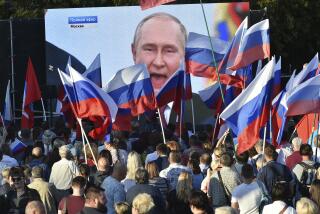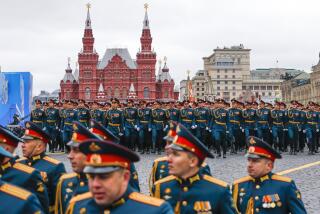Choice of the Century Faces Man of Decade : Soviet Union: Gorbachev’s miscalculations have led to the present crisis. The future doesn’t look good but there is an option: dismantle the empire to pursue democracy.
- Share via
In 1985, all was quiet on the Eastern front. The Soviet Union and its satellites may have been beset with enormous economic problems but their political systems were, by all accounts, stable. The Communist Party was in charge, the populations were quiescent and the possibility of mass turmoil was remote.
Five years later, Communist regimes are collapsing with a monotonous regularity and the Soviet Union appears to be on the verge of breakup. Was the process inevitable? Were the seeds of ignominious collapse planted in the old order?
Only starry-eyed believers in the end of history would answer “yes.” Problems would have continued, decay was likely, but collapse could occur only because of one individual--Mikhail Gorbachev, Time magazine’s Man of the Decade.
The Soviet Union’s descent into the maelstrom was the result of four miscalculations by Gorbachev:
--By unleashing unlimited glasnost to consolidate his own position, Gorbachev effectively destroyed Soviet ideology and values, debased his country’s history and traditions and delegitimized the political and social order. Into this vacuum rushed the only two value systems left unscathed by his unconsidered assault--nationalism and religion.
--By promising an immediate radical improvement in Soviet living conditions, Gorbachev not only underestimated the difficulty of getting the Soviet economy moving again, but he also raised expectations to unmanageable heights. Worse still, his inability to produce the economic breakthrough he promised frustrated the very expectations he raised and turned the non-Russian republics against a seemingly inert center.
--By encouraging social activism while attacking the hegemony of the Communist Party apparatus, Gorbachev virtually invited opposition groups to challenge the debilitated party and its pretensions to a “leading role.” Wittingly or not, Gorbachev thereby released the genie of secessionism. Glasnost , economic collapse, mass mobilization and an anti-party campaign gave non-Russian popular fronts carte blanche to convert anti-Stalinism into anti-Sovietism and to question the integrity of an empire with a long legacy of crimes.
--Finally, by failing to dismantle the Soviet Union’s external empire methodically, Gorbachev permitted Eastern Europe to explode in 1989. And, by welcoming what was really the product of his own oversight, Gorbachev undercut his ability to defuse nationalist sentiments at home.
Ironically, Gorbachev has created a no-win situation worthy of Leonid Brezhnev. If perestroika continues, the party will not survive and systematic breakup will be inevitable. Cracking down, on the other hand, means ending perestroika . Breakdown or crackdown--Wenceslaus Square or Tian An Men Square--that appears to be poor Mikhail’s unenviable choice.
What does the future hold for the hapless Soviet empire? If perestroika truly is irreversible, then the only option is breakdown--be it in the form of secessionist movements or a social revolution or both. If things have not yet reached the point of no return, either Gorbachev himself or his opponents will institute a crackdown. Is a return to Stalinism in the offing? No. Rather, a military clampdown similar to Poland’s enactment of martial law in 1981, reactivation of the KGB, a go-slow on liberalization and democratization, and a return to Brezhnevite economic methods will be the order of the day.
There is a third choice, of course, but it would require some real “new thinking”--to wit, that democracy and disintegration go together, just as imperial maintenance and dictatorship go together. Four years ago, before Gorbachev wreaked so much havoc, Russian aspirations could have been satisfied within the framework of a democratic Soviet Union. But no more. Gorbachev’s brand of perestroika may now be incompatible with a democratic Soviet Union. Instead, the only long-term hope for democracy may be within a very loose Soviet confederation, or in democratic successor states.
Dismantling the Soviet empire and pursuing democracy, or retaining the empire and quashing democracy--if the Man of the Decade makes the right choice, he deserves to be Man of the Century.
More to Read
Sign up for Essential California
The most important California stories and recommendations in your inbox every morning.
You may occasionally receive promotional content from the Los Angeles Times.













